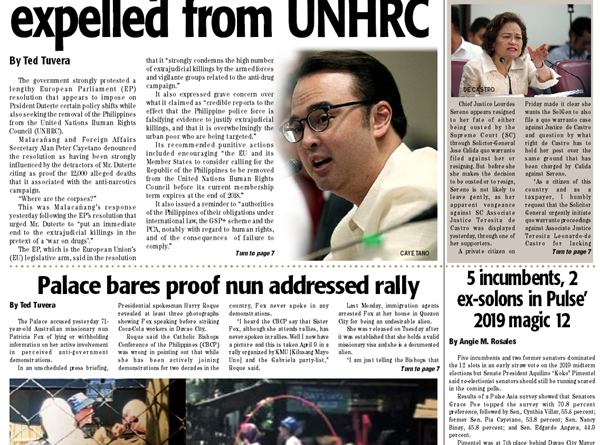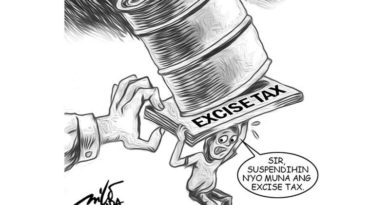ASEANEWS’ HEADLINE: –’EU body wants RP expelled from UNHRC’ Saturday, April 21, 2018
The government strongly protested a lengthy European Parliament (EP) resolution that appears to impose on Prsident Duterte certain policy shifts while also seeking the removal of the Philippines from the United Nations Human Rights Council (UNHRC).
Malacañang and Foreign Affairs Secretary Alan Peter Cayetano denounced the resolution as having been strongly influenced by the detractors of Mr. Duterte, citing as proof the 12,000 alleged deaths that it associated with the anti-narcotics campaign.
“Where are the corpses?”
This was Malacañang’s response yesterday following the EP’s resolution that urged Mr. Duterte to “put an immediate end to the extrajudicial killings in the pretext of a ‘war on drugs.’”
The EP, which is the European Union’s (EU) legislative arm, said in the resolution that it “strongly condemns the high number of extrajudicial killings by the armed forces and vigilante groups related to the anti-drug campaign.”
It also expressed grave concern over what it claimed as “credible reports to the effect that the Philippine police force is falsifying evidence to justify extrajudicial killings, and that it is overwhelmingly the urban poor who are being targeted.”
Its recommended punitive actions included encouraging “the EU and its Member States to consider calling for the Republic of the Philippines to be removed from the United Nations Human Rights Council before its current membership term expires at the end of 2018.”
It also issued a reminder to “authorities of the Philippines of their obligations under international law, the GSP+ scheme and the PCA, notably with regard to human rights, and of the consequences of failure to comply.” The GSP+ scheme provides tariff privileges to Philippine goods entering countries in the EU but such privileges are tied to certain conditions on rights protection and clean government.
“While the progress in the implementation of the GSP+ conventions is largely positive, strong concerns remain around human rights violations related to the war on drugs,” it said.
The EP called on the European Commission and the External Action Service to “use all available instruments, including the PCA (Partnership and Cooperation Agreement between the EU and the Philippines), to persuade the Philippines to put an end to extrajudicial killings related to the anti-drug campaign and, in the absence of substantive improvements, to initiate the procedural steps which could lead to the temporary withdrawal of the GSP+ preferences.”
The resolution also sought EU pressure for Mr. Duterte to allow a United Nations (UN)-led probe into the war on drugs which the President said should be done under his terms.
In the resolution, the EP also called for the release from detention of Senator Leila de Lima and the removal of United Nations Special Rapporteur Victoria Tauli-Corpuz from a government list of individuals linked to the Communist Party of the Philippines and its military arm, the New People’s Army.
Palace urges prudence on EU
Presidential spokesman Harry Roque questioned the European body’s figure of 12,000 individuals who died in the course of the war on drugs.
“They said, 12,000 have died. Where are the corpses? Where are the lawsuits filed by the 12,000 victims?” Roque dared.
“We thus call on members of the European Parliament to exercise prudence in issuing resolutions,” he added.
The Palace official noted the figures of the drug war have been enormously hyped by the local opposition to paint a negative image of Mr. Duterte.
“We understand that a number of whom have close ties with the local political opposition that try to distort realities that we have a working democracy where people have enjoyed peace and order,” Roque said.
From July 1, 2016 to March 20, 2018 – government data said there were 4,075 drug personalities killed during anti-drug operations.
Roque also assailed the European body of being “inconsistent” for taking a critical stance against Mr. Duterte’s drugs war despite their recent aid meant to finance rehabilitation efforts.
Last March, the European Union gave the Philippine government some P242 million (3.8 million euros) for supposed drug rehabilitation, saying that it was received without any conditions.
Roque also addressed the EU’s appeal to release de Lima and remove its “terrorist” tag on Tauli-Corpuz.
Roque said even the Supreme Court has found nothing irregular in de Lima’s detention.
While a vocal critic of the administration and its drug war, de Lima is charged of conspiring with detained drug lords inside the National Penitentiary during her stint as Department of Justice (DoJ) Secretary.
The government is now probing allegations that the opposition lawmaker’s 2016 senatorial campaign kitty has been funded by narcotic syndicates.
On Tauli-Corpuz’s case, Roque said she has been given all the opportunities to deny her links to the CPP-NPA.
“She is being given the opportunity to be heard, to submit evidence that she is not a terrorist and let us allow the judiciary to make the decision but it’s not for foreign lawmakers to ask that she be taken out because we have laws,” the Palace official said.
EP crossed red line — Cayetano
Cayetano also slammed the European Parliament for its “unwarranted and uncalled for actions” against the Philippines after it adopted a resolution that “already constitutes interference” in Manila’s internal affairs.
“The European Parliament has crossed a red line when it called for unwarranted actions against the Philippines,” Cayetano said in a strongly-worded statement issued Thursday, shortly after the body adopted a resolution critical of the political situation in the country.
“This resolution that the European Parliament just adopted is based on biased, incomplete and even wrong information and does not reflect the true situation on the ground,” Cayetano said.
“In case the members of the European Parliament are not aware of it, may we remind them that their recommended actions already constitute interference in the affairs of a sovereign state,” he added.
As a sovereign state, Cayetano said that the Philippines expects all members of the international community to respect the country’s prerogative to determine national priorities and policies that are responsive to the needs of its people.
He warned European legislators against efforts by certain groups to discredit the government of President Rodrigo R. Duterte.
“It is really disappointing that European lawmakers have allowed themselves to be influenced and manipulated by certain interest groups in the Philippines and abroad who have politicized and weaponized human rights as part of their efforts to undermine the legitimately installed government of President Duterte,” Cayetano said.
In his statement, the foreign affairs chief acknowledged that the views of members of the European Parliament do not reflect those of the European Union as a whole or of its individual member states.
He, however, lamented the “failure” of European legislators to appreciate the country’s efforts to inform its international partners on what it is doing to protect and promote human rights.
Cayetano said the Philippines will continue to engage its partners in a transparent manner and will continue to attach utmost importance to the promotion and protection of human rights.
“We will continue to engage the European Union in constructive dialog on all issues, including those raised by the European Parliament, based on the principles of sovereignty, non-interference, and mutual respect,” he said./ Written by Ted Tuvera / Saturday, 21 April 2018 00:00 /









.
All photographs, news, editorials, opinions, information, data, others have been taken from the Internet ..aseanews.net | [email protected] / For comments, Email to : Aseanews.Net | [email protected] | Contributor:-









